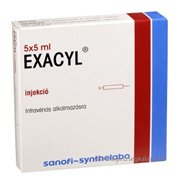Exacyl is available in two strengths and formulations.
- Exacyl film-coated tablet contains Tranexamin Acid 250mg or 500 mg.
- Exacyl Injection (ampoule) contains Tranexamix Acid 250mg or 500 mg.
What is Exacyl Used For?
Exacyl film-coated tablets and Injections are indicated in the following conditions:
- To treat abnormal bleeding caused by fibrinolysis from female genital tract, lungs, renal tract, nasal cavity and after prostatic surgery.
- To reduce or prevent hemorrhage for short duration (2-6 days) in patients with hemophilia.
- To prevent or treat excessive bleeding during and following tooth extraction.
Exacyl Dosage
- The usual adult dose of Exacyl Tablets is from 250mg to 500mg three or four times a day depending on the severity of the condition.
- In hemophilic patients, immediately before dental extraction, administer 10 mg per kg body weight of Exacyl intravenously together with replacement therapy. Following surgery, a dose of 25 mg per kg body weight may be given orally three or four times daily for 2 to 8 days.
- Exacyl 25mg per kg body weight can also be administered orally, 3 to 4 times a day beginning one day before surgery.
- For patients unable to take oral medication, Exacyl injection can be administered in a dose of 10 mg/kg bodyweight 3 to 4 times daily.
Clinical Pharmacology

Exacyl Contraindications
Tranexamic Acid is contraindicated in;
- Patients with a history of subarachnoid hemorrhage.
- Patients with color blindness. This might prohibit measuring the toxic effects of the drug on the retinal changes on long-term usage.
- Exacyl should also be avoided in patients with active intravascular clotting tendency.
Related Links
I'm pleased to have gotten this information, its been a great help .this is because I have been searching for anti hemorrhage drugs. thus knowing what Exacyl medication does ,its brought about a relief.
is it possible to get two other anti hemorrhage drugs with their mechanism d'action, form and posologie.j